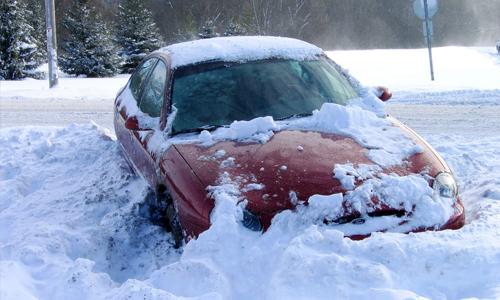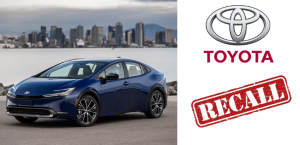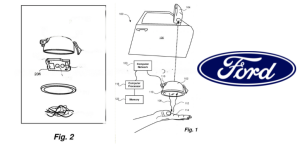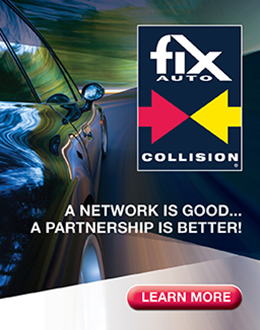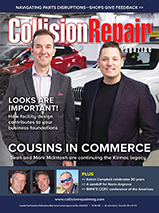By Jeff Sanford
Toronto, Ontario — January 5, 2017 — In today’s Friday Fun: extreme weather drives huge business for collision repair facilities across Canada, a warning on car-share insurance, and much much more!
Deep Freeze
The past few weeks have been all about the cold weather in North America. The National Weather Service in the U.S. issued wind chill advisories for most of the country. Evidently, there has been no end to the reports of major auto accidents across the continent, especially in the U.S. south. Drivers in Texas, Louisiana and Georgia, unaccustomed to driving on icy roads, have seen their vehicles sent to repair shops in droves. With worse weather predicted for the weekend, the car-based chaos can be expected to continue.
Reports appeared in local newspapers across the continent commenting on the sudden pick-up in business at collision repair shops as a result of the extreme weather.
Bodyshop manager at Fred Mueller Auto Body was quoted as saying the shop is backed-up with business that is triple what it was in the summer. “Most of the guys are working extra hours to catch up,” said the manager, who pointed out that deer were particularly prone to becoming victims of wintry collisions. “In cold weather deer tend to move more often, mostly in the morning and evenings… even though we had our hunting season, there’s still deer out there on the road and we get quite a few this time of year.”
A report from Iowa quoted the owner of Precision Collision Auto Body Center as saying this has been his busiest Winter after four decades. The owner has doubled the volume in his shop compared to a usual week. “We’re a lot busier than we were last year… We’ll probably be busy for a couple months from this,” he was quoted as saying. The shop has seen much damage to front and rear bumpers as cars slide into each other on icy roads.
A newspaper article noted that, “… county-wide [motorists] often waited several hours before a wrecker arrived to tow their disabled car, truck or SUV to the nearest service garage…“ According to the owner of a tow business, “We’re straight out. We’ve been doing double to triple the number of calls, getting to people within 60 to 90 minutes.” Agents for AAA Northeast fielded 62,000 calls throughout southern New England over just a couple days, according to the report. bit.ly/2lNGCby
Tesla’s in Winter
Another story related to the cold weather: A newspaper in Montreal ticked off some owners of electric vehicles (EVs) this past week when they ran a front page story detailing the troubles that owners of electric cars have in cold weather. The owners of EVs are dealing with lower battery strength as more energy is drained to heat cars. Batteries in EVs also tend to be less efficient in extremely cold temperatures.
An owner of a Tesla in Quebec responded to the article with a blog post on Electrek, a website for news about EVs. The Tesla owner offered up the math on what it means to drive an EV in the Quebec cold.
According to the owner, “Last weekend, I had to travel 150 km (mostly highways) each way to stay at a family member’s cottage north of Montreal. My Tesla Model S P85 gets about 400 km of range on a full charge, so normally I wouldn’t even think about it, even though I can only charge on a 110-volt outlet for a day at the house… But with the temperature around -25C and no Supercharger on the route (yet), I wasn’t exactly sure how it would turn out… I didn’t change my driving habits (I drive at about 118 km/h in good conditions) to get to the location and ended up arriving at the cottage with 177 km left—meaning that I used about 223 km worth of range in cold weather to travel 150 km. That’s 48 percent more energy than in ideal conditions.” The owner went on to say that, after spending the weekend at the cottage he added another 73 km in range by being plugged in to the 110-volt outlet.
“With 250 km of range and having done the trip on 223 km two days before, I was confident that I would be able to make it back…” He stopped on the way back to charge at a station for ten minutes. That added another 30 km of range. “I also slowed down to about 110 km/h on the highway with more traffic on our way back… To my surprise, my range was still 100 km when I arrived home, which means I could have almost made the trip both ways without charging at the cottage or at the DC fast-charging station… Put that on your front page Journal de Montreal.” Critics of EVs use the phrase “range anxiety” to describe the mental state that comes with having to constantly monitor the distance travelled when using an EV. This Tesla owner was having none of it.
Car Share Coverage
A widely reported story in mainstream media this week delivers a warning for those using the many new car-share services. According to a CTV television report, one driver ended up in a dispute with his insurance company after they refused to payout on a claim. According to the report, “Collision damage is often covered when you use your credit card to rent a vehicle. But if you use it for car share services like Evo and Car2Go you could run into roadblocks trying to file a claim.” The driver assumed he was covered when he had a fender bender in a shared Evo car he was maneuvering through a parking garage. The driver used his Scotiabank Momentum Visa card to pay for the car share. As the CTV story notes, “The agreement on the Visa card clearly states, ‘rental vehicles which are part of a car sharing program are eligible for collision loss damage’.” But when the victim tried to file a claim to recover his deductible, he was denied. The bill to repair the damages was $808, well below Evo’s $1000 deductible, according to the story.
The driver appealed the decision but was still denied the claim. The reason? He didn’t, “… decline the collision damage waiver with Evo.” As the story goes on to explain, “Normally when you rent a vehicle you’re given the option to decline their insurance by signing the collision damage waiver, but with car share you’re not given that opportunity.” However, the story also notes that in, “… BC you can’t opt out of collision coverage provided by car share companies. Because of that, [the driver’s] credit card agreement had another clause that should have covered him. It states, in those cases, collision loss insurance will cover any deductible that may apply.”
According to the driver, “I actually pointed that out in my appeal and they still denied it.” When the CTV reporter called Scotiabank, they admitted someone made a mistake and ended up accepting the claim. According to a statement from the bank: “When you do not have the option available to decline the rental agency’s plan, our plans will cover theft, loss and damage up to the limit of the deductible. That has been our practice to date, and we’ll ensure to re-communicate that and clarify this point with the claims examiner.” Something to keep in mind.
England, as it Happens
The CBC’s nightly radio show As it Happens recently interviewed a UK car mechanic. A client had called his shop complaining that a Honda Civic wouldn’t accelerate past 60 km per hour. When the mechanic popped the hood and removed the air filter he found the engine was full of nuts. The owner had been feeding a squirrel in their backyard. The squirrel was taking the nuts and storing them in the car’s engine. There were enough to fill a plastic shopping bag.
Also in England: A massive fire in a parking garage in Liverpool incarnated more than a thousand cars in a superheated fire. The blaze raged at over 1,000 degrees Celsius, leaving just charred shells of vehicles. Bumpers melted. Interiors were gutted. Finishes were burnt completely off. The pictures are remarkable.
According to a local news report, “The blaze even melted the concrete floor of the structure in part of the seven-floor block, rendering it unstable… All the estimated 1,400 vehicles in the parking garage, which has 1,600 spaces, were destroyed… Firefighters said an accidental fire within a vehicle caused other cars to ignite.” An insurance publication ran a story days after the fire, quoting the mayor of Liverpool as being concerned insurance companies aren’t acting quickly enough to address the disaster.
According to the report. the mayor sent a letter to the Association of British Insurers (ABI) calling for speedy claims processing related to the fire. The mayor suggested allowing people with tags from the parking lot to use those as proof their car was in the multi-storey parking lot when it burned. According to the letter, “Clearly, insurers will need proof that a customer’s car was actually in the car park, but this must not become a cold, bureaucratic response… We are all in uncharted territory in responding to such an unprecedented event and I would ask you to press upon your members the need to respond with the same imagination and generosity of spirit shown by the people of Liverpool in their initial response to the fire.
Some car owners whose vehicles were in the car park are reporting that their insurance companies are being less than helpful when it comes to processing claims. They are being told to “contact the council” to produce proof substantiating their claim without being given clarity about the relevant information needed to assess the claim.” Total claims could be over £20 million.



